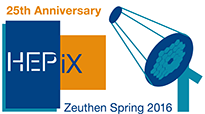Speaker
Go Iwai
(KEK)
Description
High Energy Accelerator Research Organization (KEK) plays a key role in particle physics experiments, as well as supporting the communities in Japanese universities. In order to ensure those important missions, KEK has two large-scale computer systems: the Supercomputer System (KEKSC) and the Central Computer System (KEKCC).
The KEKSC is mainly used by collaborative researches in theoretical elementary particle and nuclear physics, condensed matter physics, as well as for accelerator simulations. The system is composed of two different systems: Hitachi SR16000 model M1 (System A) and IBM Blue Gene/Q (System B).
The KEKCC caters to the research demands of particle physics, nuclear physics, the photon factory, neutron science, accelerator development, theory computation, and various fields in the science. In order to meet the demand, KEKCC consists of several subsystems: Data Analysis System, Grid Computing System (EMI/iRODS), and common IT Services such as Mail System, Web System, and so on. Grid Computing System is operated under the Worldwide LHC Computing Grid (WLCG) project. The Belle II, T2K, ILC, and Kagra experiments do their data analysis using the Grid computing infrastructure to manage large amount of experimental data.
The KEKCC is totally replaced every 4 or 5 years according to Japanese government procurement policy for computer system. Current KEKCC has been in operation since April 2012 and will be shutdown in August 2016.
We would like to share our experiences and challenges in the security, the operation, and experiment-specific applications, as well as requirements for storage and computing resources particularly focusing on Grid Computing System through nearly 4 years operation of the current KEKCC. In addition we then discuss future prospects for the next KEKCC system, which will be newly introduced in September 2016.
| Length of presentation (minutes, max. 20) | 15 |
|---|
Author
Go Iwai
(KEK)
